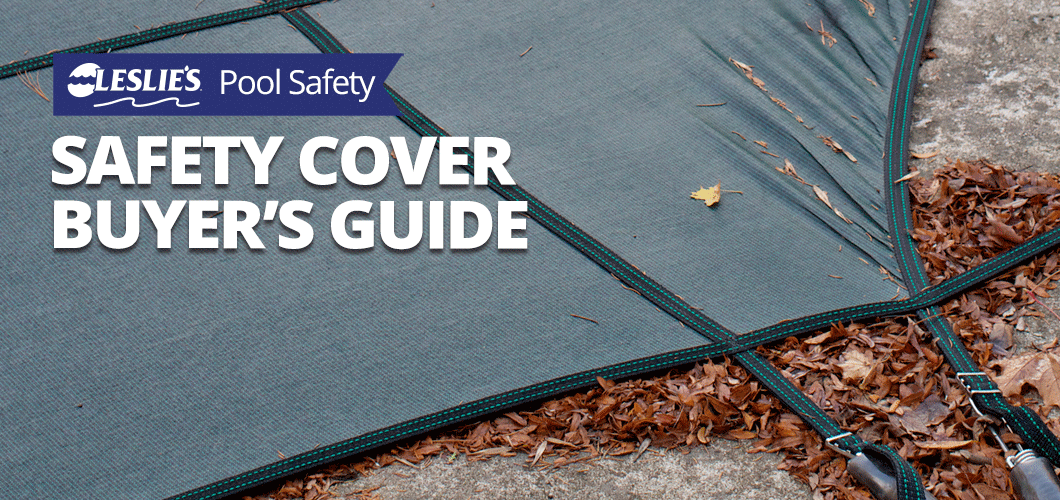
Safety Cover Buyer's Guide
If you've never used a pool safety cover before, buying one may seem like a daunting task. A safety cover is not only an attractive pool cover for the winter months, but it serves a very important purpose, especially for households with children or pets. Once the safety cover is on the pool, you can rest assured that nothing — and no one — will fall into the water. Pools come in all shapes and sizes, so it's important to know how to measure for a safety cover. There are also a few different styles of safety covers — mesh, solid, or a hybrid of the two. But what's the difference? Which safety cover is best for your pool? Keep reading to find out!
How to Measure an Inground Pool
Finding a pool cover that fits your pool is the first step. Safety covers protect your pool during the winter by keeping water and chemicals in, and dirt and debris out. They also eliminate the chance that a child or pet might accidentally fall into the pool while unsupervised. A well-fitting safety cover is one of the most important purchases you can make for your pool, and Leslie’s can help you find the right one.
DIY TIP: An ill-fitting safety cover can do more harm than good. One that's too small leaves room for possible entrapment. On the flip side, a cover that's too large or isn't fitted properly can wear out prematurely, causing dangerous weak spots and/or rips along the pool ledge.
If you have a rectangular pool, all you'll have to do is measure the length and width. If you have a rectangular pool with a left, right, or center end step section, measure the end step separately. For pools with more complex or unique shapes, the measurement process will be a little more in-depth. Keep reading about your options in the next section.
Standard or Custom Cover?

Leslie's carries standard rectangular safety cover shapes, including safety covers with a center end step, left end step, or a right end step. If your pool doesn't quite fit that mold, we can help you order a custom safety cover. Non-typical shapes, large pools, or pools with unique features are all candidates for custom covers. To determine if you should purchase a standard or custom cover, ask yourself a few questions:
- Is my pool rectangular, with square sides and no step sections?
- When measuring the length of your pool, is it 40 feet or less?
- Is there at least three feet of deck space around the entire pool?
- Looking around the pool, is the deck area free of permanent, non-removable objects — including handrails, ladders, planters, retaining walls, large slides, or water features — within 1 foot of the pool edge?
If you answered YES to all four questions, then your pool is the perfect candidate for a standard safety cover, which can be purchased easily online. If you answered NO to the first question because your pool has a side step, you may still be able to purchase your new safety cover online or in store. You'll just need to know the size of your pool to see what's available.
To know which size of safety cover you need, use a measuring tape to measure the length and width of your rectangular pool. If there is a step section that extends beyond the rectangle, measure that separately. Pool covers are sold according to pool size, and safety covers automatically include an overlap of about 1 foot on each side. For example, if you have a 14' x 28' rectangular pool, buy a cover labeled as a 14' x 28' cover. In reality, the cover you receive will be slightly larger, measuring 16' x 30'. This information is clearly stated in the product details to help ensure you're buying the correct one.
DIY TIP: If your pool already has a safety cover, but you're looking to replace it, verify the strap locations match your existing anchor placement. If they don't match up, you'll either need to consider a custom safety cover, or go through the hassle of setting new anchor points.
On the other hand, if you answered NO to any or all of the above questions, your pool will require a custom safety cover. Custom safety covers can be designed to fit any size or shape of pool, and can accommodate irregularities like walls, planters, slides, and water features. For help with your custom order, download the easy-to-use Custom Safety Cover Measuring Form, or stop in at your local Leslie's to speak with one of our pool professionals. You can also read more in our blog for tips and tricks on properly measuring for a safety pool cover.
Mesh vs. Solid Safety Covers
Pool safety covers are available in mesh, solid, or hybrid. A hybrid cover is a solid cover with a mesh drain panel that combines the best of both worlds. Both solid and mesh materials have their own distinct advantages and disadvantages. Check out the pros and cons list below to determine which cover suits you and your pool best.
Mesh Safety Covers

PROS
- Usually less expensive than solid covers.
- Lightweight material is easy to install and remove.
- Heavy-duty polypropylene fibers are tightly woven and built to last.
- Rain and melting snow pass through the mesh, so the cover won’t be weighed down by standing water.
- No puddles on the pool cover reduces the potential for accidents involving children or pets.
- Does not require a sump pump to remove standing water on top of the cover.
- Keeps all debris except fine dust particles out of the pool.
- Leaves and larger debris remain dry and blow away.
- Rainwater and melting snow replenish water lost from evaporation.
CONS
- Allows fine dust particles to enter the pool, so more vacuuming is required when removing the cover during spring opening.
- Some sunlight can enter the pool, which can harbor the growth of algae as temperatures increase.
Solid Safety Covers

PROS
- Provides a completely solid barrier between your pool and the environment.
- Super strong construction resistant to rips and tears, keeping your pool clean and your family safe.
- Prevents all water, snow, and debris from entering the pool, even fine dust particles.
- Keeps sunlight out, reducing the chances of algae growing during the winter.
- Water and chemicals do not evaporate from your pool.
- Some solid covers contain mesh drain panels, and these hybrid covers allow standing water to drain into the pool.
CONS
- Sump pumps are required for solid covers without mesh drain panels. Sump pumps prevent the cover from getting weighed down by standing water on top of the cover.
- Solid covers are heavier and require a little more work than mesh covers to install and remove.
DIY TIP: Need to buy a pool cover pump? We have plenty to choose from to suit your pool's unique needs. Pumping capacity ranges widely, from 300 GPH (gallons per hour) all the way up to 3200 GPH. There are also manual or automatic models to allow greater control of how you use the pump.
Once you've determined if you need a standard or custom safety pool cover, and you've decided whether a mesh or solid safety cover would work better for your pool, you're ready to choose your cover! Certain covers are available in different color options, including blue, green, black, gray, and tan.
Still have questions? Let our friendly pool professionals help you. For more information about pool safety covers and other pool maintenance solutions, call or stop by your local Leslie's.